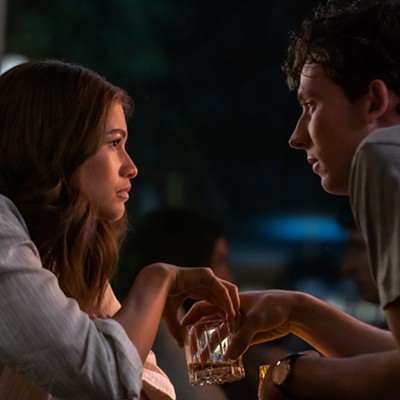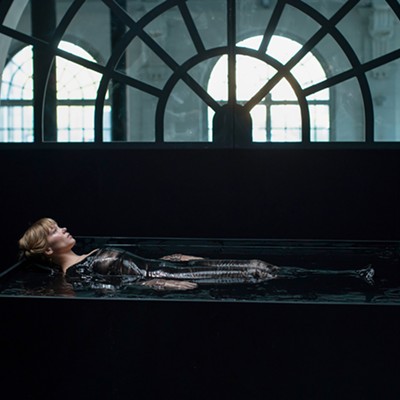Ryan Gosling plays the strong, silent type in this moody throwback to character studies of the 1970s. It’s kind of neat that this mystery man has no name, or at least never mentions one. His boss at the garage calls him “kid.” The woman in his apartment building, who he’s getting friendly with — that would be Irene (Carey Mulligan), a waitress and mom who’s waiting for her husband to be released from the slammer — never bothers to ask about his name. She’s just quietly happy that there’s a man in her life again.
And he appears to be happy that she’s there, though he never says it. He really never says much at all. One thing’s for sure: Ryan Gosling didn’t have to memorize much dialogue for this film.
He’s a driver, so let’s just call him Driver. All we know is that he just showed up in Los Angeles five or six years ago. His day job in LA is fixing cars at the garage run by Shannon (Bryan Cranston), a nice guy who’s had bad luck on his trail. His part-time job is doing daredevil stunt-driving for the movies. His after-hours gig, the one he wouldn’t talk about even if he did talk, is driving getaway cars for thieves. He excels at all three jobs, maintaining an air of coolness no matter what’s going on around him.
The film opens with an atmosphere of relaxed mayhem. Driver is sitting in his Chevy Impala, waiting for two guys to get in and get out of a theft. The scene is accompanied by a quietly throbbing soundtrack, the absence of dialogue, an approaching police presence, a tight basketball game on the car radio. Driver just takes it in. Audience members are going to be clenching fists and shifting in seats. All of this is before the credits.
So who is this guy? Where does he come from? What has led him to this situation? Here’s some advice: Don’t think about that. Don’t wonder what he’s wondering about during one of his long, wordless stares.
There is a lot of wordlessness going on here. The film is loaded with awkward silences between people, but those silences say plenty. When Shannon brings a “businessman” named Bernie (Albert Brooks, in bad-guy mode) into the picture, with hopes of funding a racecar for Driver to drive, the loathsome Bernie introduces himself to Driver, saying, “We’re a team now.” Gosling just stares at him, as if to say, “No, we’re not.”
When Irene agrees to go out for a ride with Driver, she sits silently next to him, looking really unsure about what she’s doing. Later, in her apartment, in the midst of her husband’s welcome-home party, she’s obviously thinking about Driver, while a couple of doors away, Driver is just as obviously thinking about her, and both are wondering about the newly released husband. A nice touch is the soundtrack accompaniment of the smoky Under Your Spell by Desire.
This film, punctuated with action scenes, turns into stories of yearning, of evil men doing bad things, of retribution, of — if you really want to stretch things — heroism. Dutch director Nicolas Winding Refn, who made the startlingly original Bronson, again mixes together all sorts of innovative ideas, such as matching up scenes of utter silence with outrageous bloody violence and somehow keeping it all rather elegant. That violence, by the way, committed via guns, knives, hammers, boots, fists, is unflinching, but it’ll likely make anyone watching it flinch, then laugh, nervously.
















